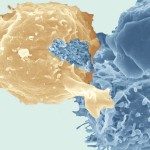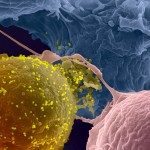Link to Pubmed [PMID] – 34634936
Link to DOI – 10.1128/mBio.01743-21
mBio 2021 10; 12(5): e0174321
The role of the complement system in HIV-1 immunity and pathogenesis is multifaceted, and an improved understanding of complement activities mediated by HIV-1-specific antibodies has the potential to inform and advance clinical development efforts. A seminal nonhuman primate challenge experiment suggested that complement was dispensable for the protective effect of the early broadly neutralizing antibody (bnAb) b12, but recent experiments have raised questions about the breadth of circumstances under which this conclusion may hold. Here, we reassess the original observation using Fc variants of IgG1 b12 that enhance complement activity and report that complement fixation on recombinant antigen, virions, and cells and complement-dependent viral and cellular lysis in vitro vary among bnAbs. Specifically, while the clinically significant V3 glycan-specific bnAb 10-1074 demonstrates activity, we found that b12 does not meaningfully activate the classical complement cascade. Consistent with avid engagement by C1q and its complex system of regulatory factors, these results suggest that complement-mediated antibody activities demonstrate a high degree of context dependence and motivate revisiting the role of complement in antibody-mediated prevention of HIV-1 infection by next-generation bnAbs in new translational studies in animal models. IMPORTANCE Given the suboptimal outcome of VRC01 antibody-mediated prevention of HIV-1 infection in its first field trial, means to improve diverse antiviral activities in vivo have renewed importance. This work revisits a loss-of-function experiment that investigated the mechanism of action of b12, a similar antibody, and finds that the reason why complement-mediated antiviral activities were not observed to contribute to protection may be the inherent lack of activity of wild-type b12, raising the prospect that this mechanism may contribute in the context of other HIV-specific antibodies.


